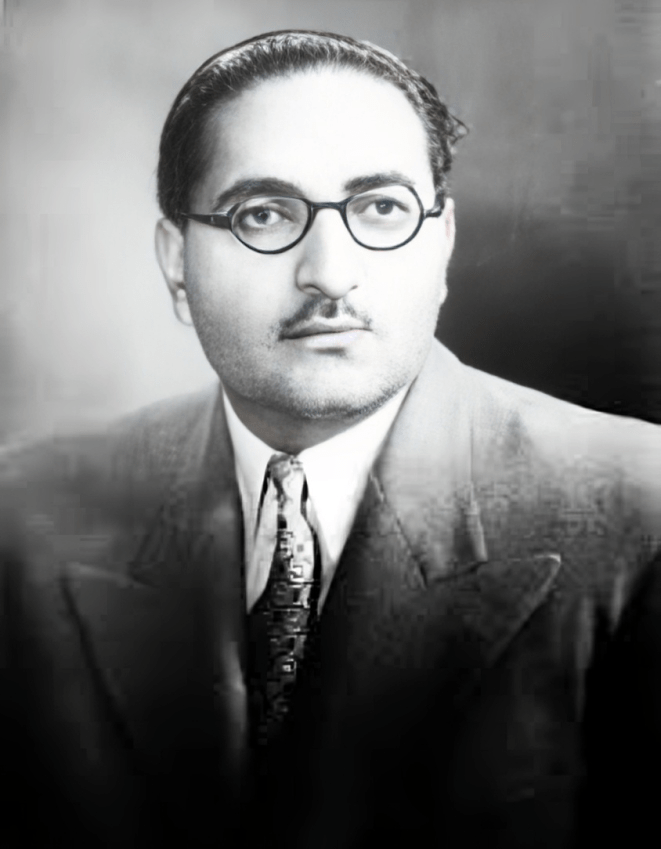Mian Mumtaz Daultana, the son of Nawab Ahmad Yar Khan Daultana, a renowned Unionist and political figure of Punjab in the pre-partition era, was born on 20th February 1916. He graduated with distinction from Government College Lahore and went to England for higher studies. There he joined Oxford University in 1933 and attained the degree of Bar at Law from England in 1938.
Following in his father’s footsteps, he began to take interest in politics when he was elected as the President of Indian Society at Oxford. Daultana joined Muslim League in 1942 and worked during the freedom movement under the leadership of Quaid-i-Azam. He was also the member of Direct Action Committee. In 1946, Mumtaz Daultana was elected on the ticket of Muslim League and in the newly created state of Pakistan became the First Finance Minister of Punjab in 1947. Daultana was also a member of the delegation sent to Delhi for seeking a solution to the Indus Basin Water Dispute and one of the signatories from Pakistan’s side when after a long discussion the accord was signed. As Finance Minister his differences developed with the Chief Minister of Punjab Mian Iftikhar Hussain of Mamdot. He complained that the Cabinet decisions were being superseded by a shadow cabinet of Mamdot. The threatened resignations of Daultana and the Revenue Minister Sardar Shaukat Hayat were averted but the conflict still continued. Mudie reported this tussle to Quaid-i-Azam and for the time being the situation normalized. But Daultana resigned on 27th May 1948. Liaquat Ali Khan asked Mamdot to take back Daultana in his cabinet but he refused. On the other hand Daultana started his political move against the Mamdot ministry and was successful when in January 1949, Governor General dissolved the ministry of Mamdot.
In the elections of March 1951 Daultana was the candidate of Muslim League while his opponents belonged to another forward block, Jinnah Muslim League. Daultana won the election by getting 166 seats and became the Chief Minister of Punjab. He made several proposals for land reforms. He wanted to remove the loopholes in the Punjab Tenancy Act of 1950, exempt tax for all the landowners having less than five acres, limit the size of land holdings and change the traditional division of crops between the landlord and the tenant. But unfortunately Daultana could not implement these proposals as he was defied by an anti-reform group formed under Pir Naubahadur Shah of Multan and a group of landowners led by Nawabzada Nasrullah Khan. Daultana tried to expel them from the party but the rival group was too strong to be overthrown. In the middle of 1952 when anti-Ahmadi Movement reached its climax, for a transitory period Martial Law was proclaimed. In March 1953 Daultana was again in a fix when Nazimuddin persuaded him not only to resign from the chief minister ship and president ship of the party but also to propose Feroze Khan Noon governor of East Pakistan as the new leader.
Daultana was also the member of Basic Principles Committee and he was in favor of the constitutional report that was finally adopted by the Constituent Assembly in September 1954. the report and then adjourned the proceedings of the meeting till 27th October in order to take up the constituent bill. On the other hand Ghulam Muhammad tried to dissolve the assembly. Daultana seconded the resolution presented by Syed Mumtaz in the Constituent Assembly that cut down the list of central subjects to five categories, namely defense, foreign affairs, currency and exchange, foreign trade, and inter-zonal communications. Ghulam Muhammad intensified his efforts to stop all the proceedings. H finally succeeded when he withdrew the case against Daultana and in return Daultana joined the camp of Ghulam Muhammad. In the elections of Second Constituent Assembly Daultana and his faction won. Nawab Mushtaq Gurmani, the provincial governor also helped his group in winning the elections.
Daultana was in favor of ‘One Unit Plan’. He supported separate electorates and made alliance with Jamaat-i-Islami as Maulana Maududi was also in favor of the separate electorates. He firmly opposed the dictatorial rule of Ayub Khan and was of the view that Ayub Khan and Zulfiqar Ali Bhutto had created many troubles for Pakistan. He criticized EBDO, through which Ayub had banned all the political parties. Daultana was against the ‘Six Points of Mujeeb’ and therefore his party adopted a resolution against them because he believed that the acceptance of these ‘Six Points’ would divide the country. When Bhutto came into power, he made Daultana High Commissioner to Britain and due to his alliance with Bhutto, he was expelled from the party. During the period of General Zia-ul-Haq, he didn’t participate in active politics but he hadn’t detached himself completely from it. He criticized the elections of 1985 and after that he never emerged on the political scene. Daultana died on January 30, 1995.
This article was last updated on Friday, Jan 04, 2008






